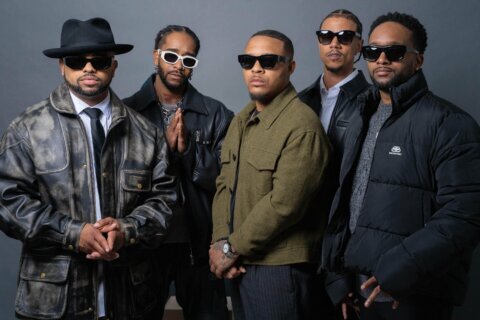WASHINGTON — Forty years ago, André De Shields starred in Broadway’s “The Wiz,” playing the title role before Richard Pryor in the 1978 movie co-starring Diana Ross and Michael Jackson.
Like De Shields, “The Wiz” has its roots in Baltimore, where it opened Oct. 21, 1974, at the Morris A. Mechanic Theatre before moving to Broadway’s Majestic Theatre Jan. 5, 1975.
Sitting in the audience for his first Broadway play was future theater director Timothy Douglas.
“When André De Shields burst onto that stage, I do believe that was the seed of my lifelong commitment in the theater being planted,” says Douglas, who is repaying the favor by casting de Shields as Stool Pigeon in “King Hedley II” at Arena Stage from Feb. 6 through March 8.
“Most of us think the most difficult thing is to get a gig. However, more difficult than that is changing how the industry perceives you, because we like to put people in niches. Once we discover what it is you do, you’re in the box the rest of your career,” says De Shields, referring to “The Wiz.” “Timothy came to me and said … ‘You don’t have to repackage yourself. I want you to inhabit this character.’ … He is demanding that I lose all of the artifices that have made me a man with a national profile.”
“Hedley” is the ninth installment of August Wilson’s “The Pittsburgh Cycle” (1988-2005), a series of 10 plays charting the African-American experience throughout the 20th century. The title role goes to Bowman Wright, who last appeared at Arena Stage as Dr. Martin Luther King Jr. in “The Mountaintop.” This time, he sports a scar on his face and seven years of prison in his blood as he tries to succeed as an ex-con entrepreneur in Pittsburgh’s unforgiving Hill District.
Pittsburgh and Baltimore, De Shields says, “are geographically different, but in terms of the energy, the life force and the people, they are mirror images of one another. Urban renewal destroyed whatever cultural spine that Baltimore had, and the ghetto … became a third-world country. … That is not unique to Pittsburgh. It’s not unique to Baltimore. It’s all of the Mid-Atlantic cities. … If you want to know American history, see it through the eyes of a black American.”
Such is the transformative power of Wilson’s plays. “King Hedley II” marks the fifth and final time that Wilson was a finalist for the Pulitzer Prize for Drama. He remains one of just seven playwrights to win multiple Pulitzer Prizes, joining the elite company of Eugene O’Neill, George S. Kaufman, Robert E. Sherwood, Thornton Wilder, Tennessee Williams and Edward Albee.
Wilson concluded his 10-play series with “Radio Golf,” which made its world premiere in 2005 at Yale Repertory Theatre, where Douglas was an aspiring theater talent. Just a few months later, both Wilson and his longtime producer Ben Mordecai were dead, both at the age of 60.
“When his work was done, it’s as if he dusted his hands off and said, ‘I’m checking out of here. I’ve done what I came to do. Now you figure it out,'” De Shields said.
Douglas is amazed how relevant the themes of “Hedley” are today.
“It’s as if there were secret chambers inside this play that couldn’t be heard when it premiered, but now we are all listening,” Douglas says. “There are lines in the play that seem to speak directly to headlines in the last several months: the hyper-American awareness of black men being gunned down in the street by white cops. … August was predicting that it would get to this level … With this collective consciousness about a very splintered understanding of race in America, the play actually speaks to every one of those splinters and hopefully brings it back to a center to be contemplated.”
This rare time for contemplation is the true gift of the theater.
“There are only two cathedrals of communication. One is called the church or temple. The other is called the theater,” De Shields says. “There’s no other example of strangers coming together in a dark environment for purposes of worship, communication, communion. And in many situations, you leave either the church or the theater knowing your neighbor, who was a stranger at the beginning of the experience, in a much deeper way than you did. … We go to these cathedrals to have a question answered, a problem solved, a crisis resolved, a burden lifted, a yolk broken.”
De Shields says this very message is hidden in the Indo-European roots of the word “entertainment.”
The second part of the word means “to hold.”
The first part of the word means “to change.”
“We performers have the responsibility of holding your attention until we have changed your consciousness,” De Shields says.
So when you click the Entertainment page on WTOP.com, let’s not merely look for the latest pop culture buzz. Let’s build a cultural forum to seek answers to society’s questions. More importantly, let’s question our answers. As we investigate movies and music and plays, let’s celebrate these artistic mediums as a way to, as Atticus said, climb inside other people’s skin and walk around in it.
You can start by seeing “King Hedley II” at Arena Stage.
Listen to the full interview below:








